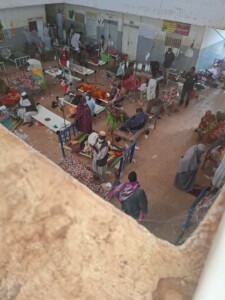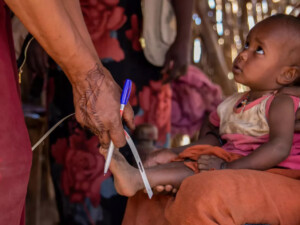Red Sea hospital reports new ‘watery diarrhoea’ cases
A health source in Red Sea state reported that nine cases of “acute watery diarrhoea” are being treated in the hospital in Tokar on Wednesday.
A health source in Red Sea state reported that nine cases of “acute watery diarrhoea” are being treated in the hospital in Tokar on Wednesday.
The source confirmed to Radio Dabanga that the patients were confined inside Tokar, and said he is concerned about the increasing number of incidents of the disease. “The environment is deteriorating terribly and the health care in the hospital is poor.”
Speaking to this station earlier, Hussein Mohamed Omar, the representative of Tokar constituency in the Red Sea Council, reported the spread of the disease in Tokar locality. Omar added that the health services in the area are deteriorating, and there is a shortage of medical staff. “There are only two general doctors in the hospital.”
In September, cholera reportedly reappeared in Sinkat in Red Sea, resulting in three deaths and the infections of three people. A journalist pointed out that the water pollution might have caused the influx in cholera cases.
'Outbreak mitigated'
At the end of October, the UN Office for the Coordination of Humanitarian Affairs (OCHA) in Sudan reported that the outbreak of 'acute watery diarrhoea' – which have been cases of cholera according to numerous independent confirmations – had been mitigated and that the number of reported infected cases in Sudan dropped significantly.
Seventy-eight new cases and two related deaths were reported between 8-14 October. There was a a peak of nearly 2,000 new cases at the end of June this year. The renewed Oral Cholera Vaccine (OCV) campaign reportedly is the key measure. The Ministry of Health, in consultation with the World Health Organization (WHO) and other stakeholders, has decided to explore the need and possibility of introducing OCV in the high-risk states in Sudan, namely White Nile, Kassala, West and South Darfur, and South Kordofan, the OCHA bulletin reads.
The Government of Sudan and several international organisations have refused to refer to call the disease by the name cholera. Since August 2016, the disease spread in eastern Sudan, and later to the Northern State and central Sudan’s El Gezira. In April, sources in White Nile state reported a rapid spread of cholera. The disease then spread to North Kordofan, and fully hit Khartoum in May.
According to the WHO and the ministry, the total number of reported cases of 'acute watery diarrhoea' across 18 states of Sudan reached over 35,000 people mid-October– including 800 related deaths since the outbreak of the infectious disease in Blue Nile state in August last year.
Sudanese doctors of the National Epidemiological Corporation confirmed that the disease is in fact cholera and reported back in early July that nearly 24,000 Sudanese have been infected and 940 cholera patients have died.
Follow #CholeraInSudan, #الكوليرا_السودان for ongoing coverage by Radio Dabanga











 and then
and then